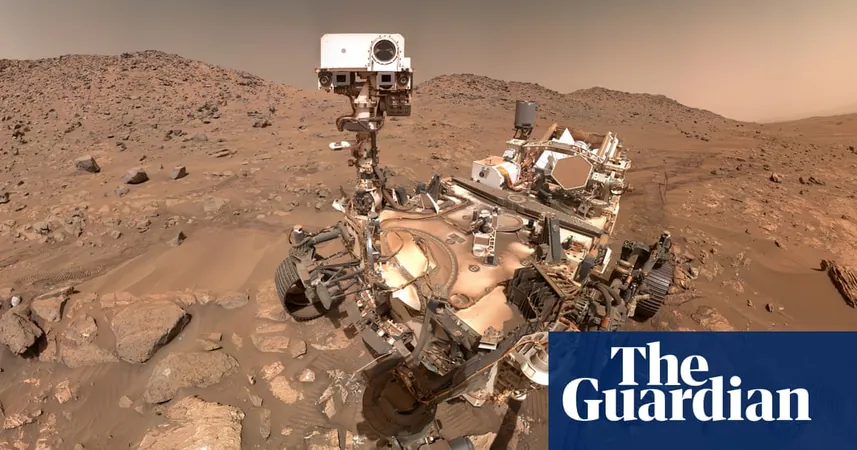
Scientists Urge Preservation of Human Legacy on Mars: A Call to Action!
2024-12-16
Author: Liam
Preserving Our First Steps on Mars
In a future not too distant, archaeologists may find themselves dusting off remnants of our very first explorations on Mars, much like the excitement we experience today when uncovering ancient artifacts on Earth. Renowned researchers argue that the various elements left behind by NASA's rovers and other human activities on the Red Planet are integral to our understanding of space exploration history.
The Importance of 'Space Heritage'
Dr. Justin Holcomb from the University of Kansas emphasizes the significance of this 'space heritage,' noting that all materials—be it the trackways left by rovers or discarded equipment—serve as tangible evidence of humanity's initial steps into our solar system. These remnants, much like iron-age huts and Roman weapons, represent important milestones in human migration and exploration.
Risks to Martian Artifacts
In their recent publication in Nature Astronomy, Holcomb and his team raised alarms about the risks these artifacts face. Natural erosion, meteorite strikes, unplanned spacecraft crashes, and the potential for future composite missions could irreparably damage this important archaeological record. Holcomb pointed out that instead of specific missions solely focused on preservation, it would be more effective to integrate protective measures within ongoing missions to minimize risk to these historical sites.
Debunking the 'Space Trash' Narrative
The researchers are also tackling the controversial view that human debris on Mars is merely 'space trash.' While they acknowledge potential environmental threats posed by these items, they stress the importance of safeguarding them as critical records of humanity’s exploratory legacy. After all, what might be perceived as rubbish today could be regarded as invaluable treasures in the future.
The Human Instinct for Exploration
Exploration is in humanity's DNA; just as our ancestors left Africa, we are branching out from Earth. The objects we've abandoned on celestial bodies are markers of our presence and culture. The past has shown us that refuse can offer insights into civilizations, and today's perceived 'junk' could become a window into our current age for future generations.
The Need for Systematic Documentation
Echoing this sentiment, Holcomb and his colleagues noted the absence of a systematic protocol for documenting Martian heritage. While a United Nations registry exists for objects launched into space, there is no equivalent for cataloging what we've left on Mars. This raises a critical question about the legacy we wish to leave in the cosmos.
Protecting Historical Sites beyond Mars
Indeed, the protection of space heritage extends beyond Mars. Historical sites like Apollo 11's Tranquility Base and the USSR’s Venera 7 landing zone are equally significant. In 2019, former European Space Agency chief Prof. Jan Wörner publicly supported conferring special status to historic lunar sites, stating that the milestones of humanity's journey into space must be preserved.
Value of Authentic Remnants
Astrophysicist Prof. Martin Rees has echoed calls for the protection of sites on Mars, recognizing that while replicas may exist, the authentic remnants hold irreplaceable value. However, he also cautioned that not all debris should command preservation efforts, emphasizing the need to prevent further pollution while pristinely maintaining prime historical artifacts.
Challenges and Future Considerations
Dr. Jon Wade from the University of Oxford shared that unlike missions to Venus, many remnants on Mars could potentially endure long after humanity’s time. Yet, he pointed out a crucial challenge: without human witnesses, future activities might obscure the impact of destructive possibilities on these sites. The temptation to exploit extraterrestrial resources could threaten the delicate balance between exploration and preservation.
Conclusion: A Call to Action
Despite the challenges of protecting these sites, Wade humorously remarked that Mars is unlikely to become a hot tourist destination anytime soon, making the urgency to preserve its heritage less immediate.
In summary, as humanity ventures deeper into the cosmos, it is imperative to acknowledge and protect our shared legacies on planets like Mars. Our future generations will look back at this era, and what they find may profoundly shape their understanding of who we were and how we dared to explore the unknown. Scientists are calling for immediate actions to ensure that the marks we leave in space are recognized and preserved as enduring symbols of human achievement. Will we heed their call before it's too late?









 Brasil (PT)
Brasil (PT)
 Canada (EN)
Canada (EN)
 Chile (ES)
Chile (ES)
 España (ES)
España (ES)
 France (FR)
France (FR)
 Hong Kong (EN)
Hong Kong (EN)
 Italia (IT)
Italia (IT)
 日本 (JA)
日本 (JA)
 Magyarország (HU)
Magyarország (HU)
 Norge (NO)
Norge (NO)
 Polska (PL)
Polska (PL)
 Schweiz (DE)
Schweiz (DE)
 Singapore (EN)
Singapore (EN)
 Sverige (SV)
Sverige (SV)
 Suomi (FI)
Suomi (FI)
 Türkiye (TR)
Türkiye (TR)